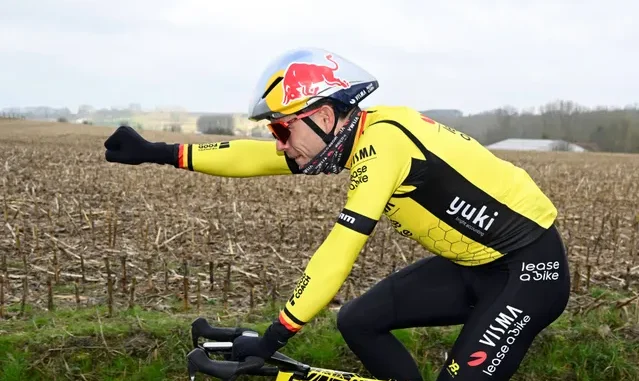
Wout van Aert’s Milano-Sanremo Absence Raises Questions..

As the cycling world gears up for one of its most prestigious one-day races, all eyes have turned to Milano-Sanremo, often dubbed the “La Primavera” or “The Spring Classic.” This year, the race is set to unfold on March 18, and the absence of Belgian star Wout van Aert has sparked considerable speculation. Known for his versatility and strength, van Aert’s decision to skip the event has left fans and experts alike wondering what could have motivated this choice.
#### A Race That Suits Him
Milano-Sanremo is famous for its long distance and unique route, which includes a mix of flat stretches and challenging climbs, making it a race that often favors a rider with the capabilities of van Aert. The course’s final challenge, the Cipressa and the Poggio climbs, typically sets the stage for explosive finishes. Van Aert, known for his sprinting prowess and ability to navigate tough terrain, appears to be a natural fit for the race, leading many to ask: why is he sitting this one out?
There are several factors that could explain his absence. In a recent interview, van Aert mentioned prioritizing his health and focusing on his long-term goals for the season. “I have to make strategic choices about my schedule,” he said. “It’s about balancing the desire to compete with ensuring I’m at my best when it really counts.”
#### Strategic Choices
Van Aert’s team, Jumbo-Visma, has had a busy early season, with important races on the calendar right up until the Tour de France later in the year. Coaches often consider the toll that one-day races can take on a rider’s body, especially when they have their eyes set on stage races. By opting out of Milano-Sanremo, the team might be looking to preserve van Aert’s energy and avoid potential overexertion this early in the season.
“It’s critical for us to manage our riders’ workloads,” explained a team spokesperson. “We’re building towards a specific goal, and sometimes that means making tough decisions about which races to enter.”
#### The Competition
Another layer to this discussion is the competitive landscape of the race. With other strong contenders in the mix, including the likes of Mathieu van der Poel and Tadej Pogačar, the competition will be fierce. While some may see van Aert’s absence as a missed opportunity, it’s possible that his team believes he can achieve greater success in later stages of the cycling season where pressure and stakes are even higher.
Pogačar, who recently won several prestigious events, is expected to be a front-runner in Sanremo, and van der Poel has shown tremendous form as well. The presence of such formidable opponents might have played a role in van Aert’s decision-making process. “It’s not just the race that’s difficult; it’s the competition as well,” a cycling analyst noted. “Van Aert has to consider his chances against such strong rivals.”
#### Looking Ahead
While the absence of Wout van Aert from Milano-Sanremo is disappointing for fans and for the spectacle of the race itself, it’s important to consider this as a broader strategy within his cycling career. His focus now shifts to upcoming Classics and stage races, where his talents will still shine brightly. With the Tour de France looming in the distance, every decision made now could be pivotal in determining the success of his season overall.
In the world of competitive cycling, scope for recovery and smart planning is often what sets the champions apart. As the dust settles on Milano-Sanremo, the cycling community will be watching closely to see how van Aert navigates the rest of the season. His absence will certainly be felt on the day of the race, but with a strategy firmly in place, it could lead to even greater victories down the line.
#### Conclusion
Wout van Aert’s decision to skip Milano-Sanremo raises intriguing questions about the nature of competitive strategy in cycling. As the race approaches without him, the focus will be on the competing riders, but fans will undoubtedly keep an eye on van Aert’s future endeavors. Whether he emerges victorious in subsequent events or simply learns from this tactical decision, one thing is clear: his presence—and absence—shapes the narrative of the cycling season.
Leave a Reply